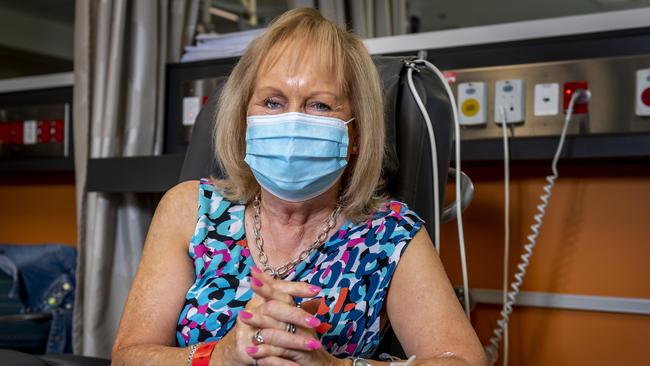New hope for cancer patients as genomic scanning sheds new light on tumours
Cancer sufferers could soon receive tailor-made treatments thanks to a new technique allowing doctors to look closely at the genetic makeup of tumours.

Victoria
Don't miss out on the headlines from Victoria. Followed categories will be added to My News.
The latest frontier in cancer treatment is seeing Melbourne doctors scanning the genetics of their patients’ tumours to shed new light in their individual disease, saving more lives in the process.
Although the use of genomics in cancer care is still rare in Australia, the increasing success in finding new and often left-field treatments for patients with few other options is seeing its use expand.
While cancers are traditionally treated according to their location – such as skin, breast or lung cancers – specialists at Victoria’s Comprehensive Cancer Centre are now digging further into the genetic makeup of their most difficult cases’ tumours for chinks in their armour.
VCCC Executive Director Professor Grant McArthur said advances in genetic screening made it possible to diagnose or even reclassify some mystery tumours.
“It is rapidly becoming and important part of our tools,” Prof McArthur said.
“We have scratched the surface but, building up now, genomics is starting to do more comprehensive analysis of a cancer and really looking at large number of genes, looking at the patterns of mutations that happen in a cancer.
“Now it is possible to look at a cancer and say ‘yes, that is due to tobacco, that was due to UV light’, or there is a signature of a genetic predisposition.
“There may be less than a one in 100 chance of finding something but, if you are a patient and that gives you a new treatment option, that means a lot to you.”
To mark World Cancer Day the VCCC will today stage an event outlining the latest genetic advances which increasingly allow doctors to identify and target the drivers of an individual’s tumour in cases that do not behave typically.
In a remarkable 2019 Melbourne case a man thought to have just days to live due to an untreatable bile duct cancer received a lifeline when samples showed his tumours carried a genetic quirk more common in lung cancer.
Although lung cancer drugs would never otherwise have been contemplated in his case a new medications was tried and, so far, has overcome his disease.
Vicky Morrison, 74, is one of the latest patients to benefit.
After losing an eye to melanoma 12 years ago, the Rosebud grandmother’s cancer returned four years ago with tumours in her head, lungs and thorax.
When she all conventional treatment options had been exhausted her Peter Mac oncologist Dr Stephen Luen turned to whole genome sequencing, discovering Ms Morrison’s disease was different to standard melanoma cases and may respond to an experimental anti-CD25 antibody.
Now thriving on a trial of the drug, Ms Morrison is also buoyed by the knowledge a second emerging medication may become an option in the future, if needed.
“I am 74-years young with 11 grandchildren – I want to live to 100,” Ms Morrison said.
“I am either going to get rid of the melanomas or I am might die with melanoma, but my aim is not to die from it. That’s my goal and so far I am beating it all.
“Each year with this wonderful hospital, research and scientists there is another drug.”
The once high price of genetic mapping has also dropped in recent years, with a basic assay to examine a small number of genes costing a few hundred dollars, while more extensive sequencing costs upwards of $1000.
However, Dr Luen said sequencing’s benefits are currently limited to rare cases who cannot be helped by conventional protocols or paediatric patients, who often have more straightforward drivers behind their disease that can be targeted with existing therapies.
“We now have really comprehensive genetic testing and assays and the drugs just keep getting better and better,” Dr Luen said.
“More and more we are now seeing clinical trials where they don’t care where the cancer has come from, they are just looking to screen genetically and target that.”
It comes as human clinical trials for a world-first drug candidate, developed by Australian researchers, to treat rare and deadly glioblastoma get underway this year.
News of the trials comes in time to recognise World Cancer Day on Thursday.




